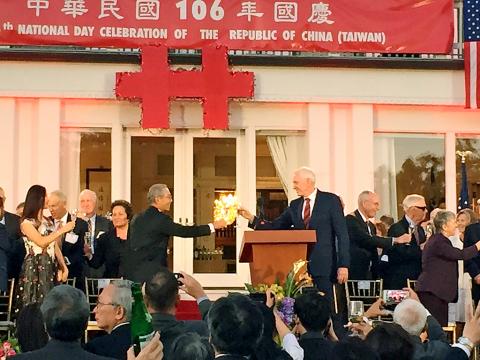President Tsai Ing-wen (蔡英文) is a pragmatic and responsible leader and the US thanks Tsai for maintaining stable cross-strait links even as Beijing ratchets up its pressures on Taiwan, American Institute in Taiwan (AIT) Chairman James Moriarty said on Wednesday at an event marking Double Ten National Day in Washington.
It is apparent that cross-strait relations are affected by the lack of trust and the US is to actively encouraging constructive dialogue that seeks to avoid miscalculations and reconcile differences through patience, flexibility and innovation, Moriarty said in a prepared speech for the event held at the Taipei Economic and Cultural Representative Office’s Twin Oaks Estate.
The US will continue to help China and Taiwan to find a peaceful solution that is acceptable to both peoples, he said, adding neither side should attempt to change the “status quo” unilaterally.

Photo: Nadia Tsao, Taipei Times
Peaceful and stable cross-strait relations are beneficial to both sides and are in the US national interest, he said.
Moriarty declined to comment on Premier William Lai’s (賴清德) recent comments about Taiwanese independence, saying he would not discuss cross-strait relations on the basis of any individual comment.
However, the US does wish to see constructive dialogue across the Taiwan Strait, he said.
In response to questions from reporters, Morarty said “only time will tell” whether Beijing would change direction in cross-strait relations, adding this was an issue decided by Beijing, and over which the US has no control.
Trust between Taiwan and the US should begin with effective communications and Tsai has showed pragmatism and innovation in her conduct with China, he said.
However, Taiwan and China must conduct exchanges in that spirit if the relationship is to develop, he said.
Asked about US President Donald Trump’s scheduled trip to China next month, Moriarty downplayed the possibility that Trump would make major policy changes during his visit.
“I do not anticipate the occurrence of anything surprising,” he said.
The relationship between Taiwan and the US has solid foundations and it is a mature relationship that is supported powerfully by the efforts of both sides, he added.
Moriarty also said that he was not aware of any specific Chinese plans to invade Taiwan, but each nation must take its security seriously, adding that all militaries make plans.
Taiwan should develop a powerful military for defense and deterrence against attacks, he said.
As Taiwan and the US develop a relationship, it is also necessary to pursue stability across the Strait to achieve stability and prosperity in the broader region, Moriarty said.
Taiwan’s safety is highly important to the greater security of the Asia-Pacific region and no one should take its security as a given, he said.
The US believes that a safe, confident and non-coerced Taiwan would be better for the development of constructive relations with Beijing, therefore, it supports Taiwan’s participation in international affairs, economic ties and security cooperation, he said.
While the US will continue the sales of arms and other services necessary for Taiwan’s capacity for self-defense, the relationship between the two nations are not limited by arms sales alone, he said.
The US will do its utmost to promote Taiwan’s participation in international affairs, Moriarty said, adding that he was please Representative to the US Stanley Kao (高碩泰) took part in the last month’s Community of Democracies summit, which was chaired by US Secretary of State Rex Tillerson.

CAUTION: Based on intelligence from the nation’s security agencies, MOFA has cautioned Taiwanese travelers about heightened safety risks in China-friendly countries The Ministry of Foreign Affairs (MOFA) yesterday urged Taiwanese to be aware of their safety when traveling abroad, especially in countries that are friendly to China. China in June last year issued 22 guidelines that allow its courts to try in absentia and sentence to death so-called “diehard” Taiwanese independence activists, even though Chinese courts have no jurisdiction in Taiwan. Late last month, a senior Chinese official gave closed-door instructions to state security units to implement the guidelines in countries friendly to China, a government memo and a senior Taiwan security official said, based on information gathered by Taiwan’s intelligence agency. The

The National Immigration Agency (NIA) said yesterday that it will revoke the dependent-based residence permit of a Chinese social media influencer who reportedly “openly advocated for [China’s] unification through military force” with Taiwan. The Chinese national, identified by her surname Liu (劉), will have her residence permit revoked in accordance with Article 14 of the “Measures for the permission of family- based residence, long-term residence and settlement of people from the Mainland Area in the Taiwan Area,” the NIA said in a news release. The agency explained it received reports that Liu made “unifying Taiwan through military force” statements on her online

Taiwan Semiconductor Manufacturing Co (TSMC), the world’s largest contract chipmaker, said yesterday that it is looking to hire 8,000 people this year, at a time when the tech giant is expanding production capacity to maintain its lead over competitors. To attract talent, TSMC would launch a large-scale recruitment campaign on campuses across Taiwan, where a newly recruited engineer with a master’s degree could expect to receive an average salary of NT$2.2 million (US$60,912), which is much higher than the 2023 national average of NT$709,000 for those in the same category, according to government statistics. TSMC, which accounted for more than 60 percent

Tung Tzu-hsien (童子賢), a Taiwanese businessman and deputy convener of the nation’s National Climate Change Committee, said yesterday that “electrical power is national power” and nuclear energy is “very important to Taiwan.” Tung made the remarks, suggesting that his views do not align with the country’s current official policy of phasing out nuclear energy, at a forum organized by the Taiwan People’s Party titled “Challenges and Prospects of Taiwan’s AI Industry and Energy Policy.” “Taiwan is currently pursuing industries with high added- value and is developing vigorously, and this all requires electricity,” said the chairman